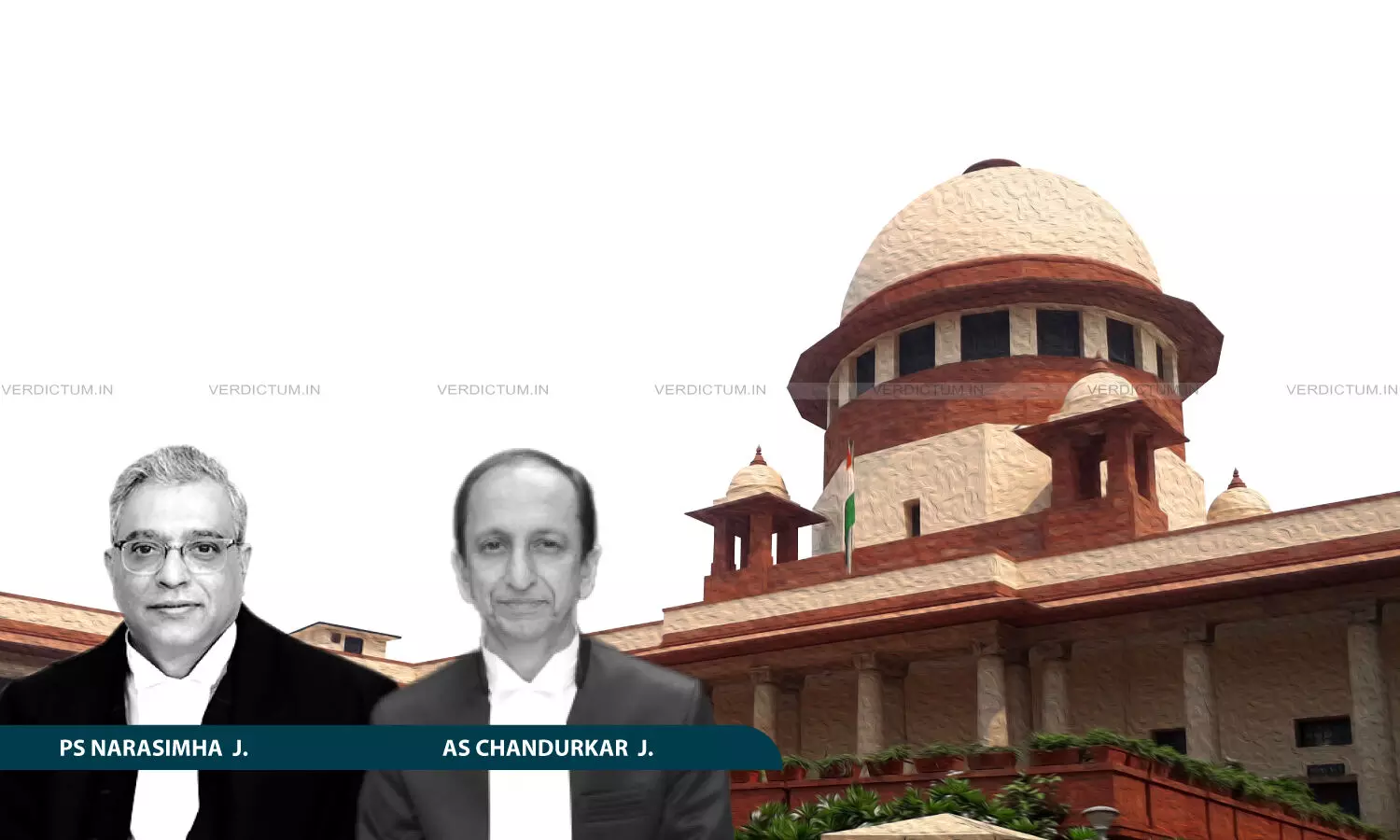
Justice P.S. Narasimha, Justice Atul S. Chandurkar, Supreme Court
Reputation Of Force Amongst Civilians Affected: Supreme Court Refuses To Interfere With Penalty Imposed On CISF Constable
 |
|The Supreme Court was considering an Appeal filed by the Central Industrial Security Force-CISF Constable aggrieved by the penalty imposed pursuant to disciplinary proceedings initiated against him by the Respondents.
The Supreme Court, while denying relief to a CISF Constable posted at a camp accused of indulging in some unwarranted activity, has observed that the same has affected the reputation of the Force amongst the civilians.
The Court was considering an Appeal filed by the Central Industrial Security Force-CISF Constable aggrieved by the penalty imposed pursuant to disciplinary proceedings initiated against him by the Respondents.
The Bench of Justice PS Narasimha and Justice AS Chandurkar observed, "....Though it was held that there was no evidence of trespass into the family quarter of Mr. Jhan Mohammed, the fact that the appellant was permitted to leave only after intervention of his superiors who had assured departmental action against him was sufficient to hold that the appellant had indulged in some unwarranted activity by which the civilians were agitated thereby affecting the reputation of the Force amongst the civilians....."
Facts of the Case
When the Appellant was serving as a constable at Mallaram Camp, he was served with a statement of articles of charge stating that one day, he had left the Camp without prior permission and had trespassed into the family quarters of someone at a distance of about 12 km from his company Camp. It was also stated that the appellant was guilty of gross indiscipline and conduct unbecoming of a member of the Armed Forces of the Union, as he had indulged in unwarranted activities affecting the reputation of the Force amongst the civilians of the colony. The Appellant was placed under suspension and disciplinary proceedings were initiated and the Inquiry Officer held that both charges had been proved against the Appellant.
The Appellant made a representation against the Inquiry Report. However, the Disciplinary Authority proceeded to impose the penalty of reduction of Appellant’s pay to the minimum of the pay-scale under the Fifth Pay Commission for a period of three years. Future increments were also withheld during the period of reduction of pay scale and the Appellant preferred an Appeal against the said order. The Appellate Authority modified the order of penalty and directed reduction of the Appellant’s pay-scale by one stage for a period of two years. The Appellant was held not entitled to earn any increment during the said period.
Aggrieved, the Appellant approached the Delhi High Court challenging the order of penalty. The High Court therefore found that though charge No. 1 was not proved, the evidence on record when tested on the principle of probability supported charge No. 2. It also found that the penalty as reduced by the Appellate Authority was commensurate with the wrong that was committed.
Reasoning By Court
The Court was satisfied that the impugned judgment does not call for any interference and observed, "....Undisputedly, the appellant was issued an out-pass on 27.08.1995 to enable him to visit the hospital between 10:00 AM to 12:00 noon on that day. Instead of visiting the hospital, the appellant was found at the residential colony at a distance about 12 kms from his Camp. The appellant in his deposition was unable to produce any document with regard to his visit to the hospital. He admitted that he had visited the residential colony to enquire about the quarters allotted to another constable. He further admitted that he had been confined by the civilians at the residential colony and it was only after the arrival of his superior, Inspector Lakra who had assured the gathering that departmental inquiry would be held against the appellant was he permitted to go. The High Court rightly found that the first charge that the appellant had left the camp without prior permission had not been proved. It however found that though the first limb of charge No. 1 was not established, the other limb of the said charge read with charge No. 2 had been proved. It was factually found that the appellant was at a distance of about 12 kms from the Camp instead of the hospital and that he had been detained by civilians on account of indulging in some unwarranted activity."
The Appeal was accordingly dismissed.
Cause Title: Const. Amar Singh vs. Union Of India & Ors. [Neutral Citation: 2025 INSC 1055]
Click here to read/ download Order